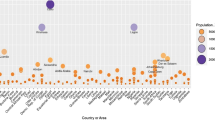Abstract
A mechanism has been established to improve integration of international climate-related programmes. Known as the Climate Agenda it outlines a programme, that in a cost-effective way, responds to national obligations to respond to international agreements as well as their national needs for social and economic development. The paper briefly describes the Climate Agenda and the incorporation within it of studies of climate impact assessments and response strategies to reduce vulnerability. The need for increased emphasis on climate impact assessment and for the development of effective adaptation measures is emphasised following the elaboration of a Kyoto Protocol to the United Nations Framework Convention on Climate Change (UNFCCC). UNEP's efforts to identify national programmes contributing to the Climate Agenda are described.
The response from developing countries has, however, been very disappointing, even from countries where we know work is ongoing through funding by GEF or US Country Studies Program and other bilateral programmes. Initial compilation of information available so far shows that many developed countries are putting a lot into the area of impact assessment of not just climate change, but also climate variability. There remain some research gaps, especially in the area of assessment of climate impacts on ecosystems, hydrological systems, etc. Considerable efforts are presently being directed at reduction of emissions of greenhouse gases and in the case of developing countries, most efforts are being directed towards completing national communications and providing baseline data for future studies.
The paper refers to early activities by UNEP in cooperation with other international organizations to undertake integrated assessments of the impacts of climate change on important socio-economic sectors and the later incorporation of lessons learned into the IPCC Guidelines for Assessing Impacts of Climate Change.
Later sections outline the development of a handbook on methods for climate change impact assessment and adaptation strategies as a practical approach to national assessments and the development of appropriate and cost-effective response to climate change.
The initiation of a GEF-funded project to apply the methods contained in the handbook and improve the results based on national studies is also described for both developed and developing countries.
Working in collaboration with a team of international experts under the coordination of the Institute of Environmental Studies at Vrije University (Amsterdam), the goal of this ongoing project is to develop a valuable methodological tool that Parties to the UNFCCC may apply to develop national climate change impact and adaptation assessments. Development of these guidelines was linked to a series of country studies in Antigua and Barbuda, Estonia, Cameroon and Pakistan funded under a UNEP/GEF project. The application of the first version of the UNEP Handbook by national study teams in these four countries is making valuable technical and practical contributions and will ensure that the next version of the Handbook will be a more useful tool for experts in developing countries undertaking similar studies in the future. The methods contained in the Handbook are also the basis for similar assessments funded under bilateral development programmes in other countries. These and similar studies elsewhere are coordinated with the UNEP programme and will eventually aim to create reliable and comparable assessments, a compatible set of tools for such purpose and the identification of realistic adaptation options for incorporation into national planning for adapting to climate change. The paper also addresses how climate impact assessment and response strategies are undertaken as part of national enabling activities carried out in co-operation with UNEP.
Similar content being viewed by others
Author information
Authors and Affiliations
Rights and permissions
About this article
Cite this article
Usher, P. Integrating Impacts into Adaptation Measures. Environ Monit Assess 61, 37–48 (2000). https://doi.org/10.1023/A:1006305832380
Issue Date:
DOI: https://doi.org/10.1023/A:1006305832380




